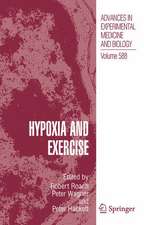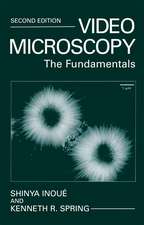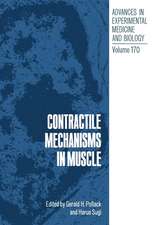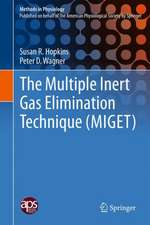Hypoxia: Into the Next Millennium: Advances in Experimental Medicine and Biology, cartea 474
Editat de Robert C. Roach, Peter D. Wagner, Peter H. Hacketten Limba Engleză Paperback – 9 noi 2012
| Toate formatele și edițiile | Preț | Express |
|---|---|---|
| Paperback (4) | 385.01 lei 43-57 zile | |
| Springer Us – 9 noi 2012 | 385.01 lei 43-57 zile | |
| Springer Us – 16 dec 2012 | 1415.01 lei 43-57 zile | |
| Springer Us – 3 dec 2010 | 1425.04 lei 43-57 zile | |
| Springer Us – 30 mai 2018 | 1436.57 lei 43-57 zile | |
| Hardback (3) | 1422.67 lei 43-57 zile | |
| Springer Us – 31 dec 2003 | 1422.67 lei 43-57 zile | |
| Springer Us – 31 ian 2002 | 1433.83 lei 43-57 zile | |
| Springer Us – 25 iun 2016 | 1457.78 lei 43-57 zile |
Din seria Advances in Experimental Medicine and Biology
- 9%
 Preț: 719.56 lei
Preț: 719.56 lei - 5%
 Preț: 717.00 lei
Preț: 717.00 lei - 5%
 Preț: 717.00 lei
Preț: 717.00 lei - 15%
 Preț: 640.24 lei
Preț: 640.24 lei - 5%
 Preț: 715.71 lei
Preț: 715.71 lei - 5%
 Preț: 716.28 lei
Preț: 716.28 lei - 20%
 Preț: 691.93 lei
Preț: 691.93 lei - 5%
 Preț: 1031.00 lei
Preț: 1031.00 lei - 5%
 Preț: 820.42 lei
Preț: 820.42 lei - 5%
 Preț: 716.28 lei
Preț: 716.28 lei - 15%
 Preț: 641.38 lei
Preț: 641.38 lei - 5%
 Preț: 717.20 lei
Preț: 717.20 lei - 5%
 Preț: 715.35 lei
Preț: 715.35 lei - 5%
 Preț: 1113.83 lei
Preț: 1113.83 lei - 20%
 Preț: 1161.71 lei
Preț: 1161.71 lei - 5%
 Preț: 1170.51 lei
Preț: 1170.51 lei - 18%
 Preț: 1119.87 lei
Preț: 1119.87 lei - 5%
 Preț: 1288.48 lei
Preț: 1288.48 lei - 5%
 Preț: 1164.67 lei
Preț: 1164.67 lei - 5%
 Preț: 1101.73 lei
Preț: 1101.73 lei - 18%
 Preț: 1123.67 lei
Preț: 1123.67 lei - 5%
 Preț: 1435.64 lei
Preț: 1435.64 lei - 20%
 Preț: 1044.10 lei
Preț: 1044.10 lei - 18%
 Preț: 946.39 lei
Preț: 946.39 lei - 5%
 Preț: 292.57 lei
Preț: 292.57 lei - 18%
 Preț: 957.62 lei
Preț: 957.62 lei - 18%
 Preț: 1235.76 lei
Preț: 1235.76 lei - 5%
 Preț: 1231.55 lei
Preț: 1231.55 lei - 5%
 Preț: 1292.30 lei
Preț: 1292.30 lei - 5%
 Preț: 1102.10 lei
Preț: 1102.10 lei - 18%
 Preț: 1132.81 lei
Preț: 1132.81 lei - 5%
 Preț: 1165.19 lei
Preț: 1165.19 lei - 5%
 Preț: 1418.48 lei
Preț: 1418.48 lei - 5%
 Preț: 1305.63 lei
Preț: 1305.63 lei - 18%
 Preț: 1417.72 lei
Preț: 1417.72 lei - 18%
 Preț: 1412.99 lei
Preț: 1412.99 lei - 24%
 Preț: 806.15 lei
Preț: 806.15 lei - 18%
 Preț: 1243.29 lei
Preț: 1243.29 lei - 5%
 Preț: 1429.44 lei
Preț: 1429.44 lei - 5%
 Preț: 1618.70 lei
Preț: 1618.70 lei - 5%
 Preț: 1305.12 lei
Preț: 1305.12 lei - 18%
 Preț: 1124.92 lei
Preț: 1124.92 lei - 5%
 Preț: 1097.54 lei
Preț: 1097.54 lei - 15%
 Preț: 649.87 lei
Preț: 649.87 lei - 5%
 Preț: 1097.54 lei
Preț: 1097.54 lei - 18%
 Preț: 945.79 lei
Preț: 945.79 lei - 5%
 Preț: 1123.13 lei
Preț: 1123.13 lei - 20%
 Preț: 816.43 lei
Preț: 816.43 lei
Preț: 385.01 lei
Preț vechi: 405.28 lei
-5% Nou
Puncte Express: 578
Preț estimativ în valută:
73.67€ • 77.11$ • 61.32£
73.67€ • 77.11$ • 61.32£
Carte tipărită la comandă
Livrare economică 31 martie-14 aprilie
Preluare comenzi: 021 569.72.76
Specificații
ISBN-13: 9781461371342
ISBN-10: 1461371341
Pagini: 476
Ilustrații: XVI, 456 p.
Dimensiuni: 178 x 254 x 25 mm
Greutate: 0.82 kg
Ediția:Softcover reprint of the original 1st ed. 1999
Editura: Springer Us
Colecția Springer
Seria Advances in Experimental Medicine and Biology
Locul publicării:New York, NY, United States
ISBN-10: 1461371341
Pagini: 476
Ilustrații: XVI, 456 p.
Dimensiuni: 178 x 254 x 25 mm
Greutate: 0.82 kg
Ediția:Softcover reprint of the original 1st ed. 1999
Editura: Springer Us
Colecția Springer
Seria Advances in Experimental Medicine and Biology
Locul publicării:New York, NY, United States
Public țintă
ResearchCuprins
Mountain Medicine.- 1. Herb Hultgren in Peru: What Causes High Altitude Pulmonary Edema?.- 2. High Altitude Cerebral Edema and Acute Mountain Sickness: A Pathophysiology Update.- 3. Lung Disease at High Altitude.- 4. Commuting to High Altitude.- 5. The Pregnant Altitude Visitor.- High Altitude Pulmonary Edema.- 6. High Altitude Pulmonary Edema: Introduction.- 7. Pulmonary Hemodynamics: Implications for High Altitude Pulmonary Edema (HAPE).- 8. High-Altitude Pulmonary Edema: From Exaggerated Pulmonary Hypertension to a Defect in Transepithelial Sodium Transport.- Frontiers in Neuroscience: The Blood-Brain Barrier.- 9. Hypoxia and the Blood-Brain Barrier: Introduction.- 10. What is the Blood-Brain Barrier? A Molecular Perspective.- 11. Mediators of Cerebral Edema.- Frontiers in Neuroscience: The Hypoxic Brain.- 12. The Hypoxic Brain: Introduction.- 13. High Altitude Headache.- 14. The Hypoxic Brain: Insights from Ischemia.- 15. Food for Thought: Altitude versus Normal Brain Function.- Hypoxia and Lactate: New Insights.- 16. Are Arterial, Muscle and Working Limb Lactate Exchange Data Obtained on Men at Altitude Consistent with the Hypothesis of an Intracellular Lactate Shuttle?.- 17. Role of Pyruvate Dehydrogenase in Lactate Production in Exercising Human Skeletal Muscle.- 18. Cross-Species Studies of Glycolytic Function.- Hypoxia and Regulation of Vascular Growth.- 19. Hypoxia Induces Cell-Specific Changes in Gene Expression in Vascular Wall Cells: Implications for Pulmonary Hypertension.- 20. Oxygen and Placental Vascular Development.- 21. Vascular Growth in Hypoxic Skeletal Muscle.- Human Physiology in Extreme Hypoxia.- 22. Recent Advances in Human Physiology at Extreme Altitude.- 23. Operation Everest III (COMEX ’97).- 24. Dynamic Cerebral Autoregulation at HighAltitude.- 25. Kangchenjunga 1998.- 26. Why Does the Exercise Cardiac Output Fall During Altitude Residence and is It Important?.- Chronic Mountain Sickness Consensus Group.- 27. International Consensus Group on Chronic Mountain Sickness.- Tribute to Niels Lassen.- 28. Niels Lassen.- Abstracts.- 29. Abstracts from the 11th International Hypoxia Symposium.- Author Index.
Notă biografică
Dr. Robert Roach is the Director of the Altitude Research Center at the University of Colorado. He specializes in the study of physiological adaptations by humans to high altitude, with a recent emphasis on the genomic responses to allow humans to thrive in hypoxia.
Dr. Peter Wagner is a Distinguished Professor of Medicine and Bioengineering at the University of California, San Diego. His research addresses the theoretical and experimental basis of oxygen transport and its limitations in the lungs and skeletal muscles in health and disease.
Dr. Peter Hackett is a world-renowned high altitude expert and altitude research pioneer. He is a leading authority on altitude illness, high altitude climbing, wilderness medicine, and the effects of altitude on people living and working in the mountains.
Textul de pe ultima copertă
The latest in a series of books from the International Hypoxia Symposia,this volume spans reviews on key topics in hypoxia, and abstracts from posterand oral presentations. The biannual International Hypoxia Symposia arededicated to hosting the best basic scientific and clinical minds to focus onthe integrative and translational biology of hypoxia. Long before‘translational medicine’ was a catchphrase, the founders of the InternationalHypoxia Symposia brought together basic scientists, clinicians andphysiologists to live, eat, ski, innovate and collaborate in the CanadianRockies.
This collection of reviews and abstracts is divided into six sections,each covering new and important work relevant to a broad range of researchersinterested in how humans adjust to hypoxia, whether on the top of Mt. Everestor in the pulmonary or cardiology clinic at low altitude. The sections include:
Dr. Peter Wagner is a Distinguished Professorof Medicine and Bioengineering at the University of California, San Diego. Hisresearch addresses the theoretical and experimental basis of oxygen transportand its limitations in the lungs and skeletal muscles in health and disease.
Dr. Peter Hackett is a world-renowned high altitude expert and altituderesearch pioneer. He is a leading authority on altitude illness, high altitudeclimbing, wilderness medicine, and the effects of altitude on people living andworking in the mountains.
This collection of reviews and abstracts is divided into six sections,each covering new and important work relevant to a broad range of researchersinterested in how humans adjust to hypoxia, whether on the top of Mt. Everestor in the pulmonary or cardiology clinic at low altitude. The sections include:
- Epigenetic Variations in Hypoxia
- High Altitude Adaptation
- Hypoxia and Sleep
- Hypoxia and the Brain
- Molecular Oxygen Sensing
- Physiological Responses to Hypoxia
Dr. Peter Wagner is a Distinguished Professorof Medicine and Bioengineering at the University of California, San Diego. Hisresearch addresses the theoretical and experimental basis of oxygen transportand its limitations in the lungs and skeletal muscles in health and disease.
Dr. Peter Hackett is a world-renowned high altitude expert and altituderesearch pioneer. He is a leading authority on altitude illness, high altitudeclimbing, wilderness medicine, and the effects of altitude on people living andworking in the mountains.
Caracteristici
Discusses the latest up-to-date research and discoveries related to hypoxia Spans reviews on key topics in hypoxia Covers findings revealed at the latest International Hypoxia Symposia Includes supplementary material: sn.pub/extras













